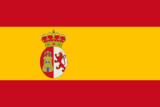- "Five Flags" redirects here. For other uses, see Five Flags (disambiguation).
Pensacola is often called the City of Five Flags due to the five national governments who have controlled the area at various times: Spain, France, Britain, the Confederacy and the United States. These five governments in fact used a variety of flags over the years.
| Flag | Name | Usage | Notes |
|---|---|---|---|

|
Flag of Castile and León | Luna expedition 1559 |
Notes |

|
Cross of Burgundy flag | First Spanish period 1698-1719 |
The France Modern banner of Charles V, representing the Trinity[1] |

|
French flag | French period 1719-1722 |
Notes |

|
Cross of Burgundy flag | Second Spanish period 1723-1763 |
Notes |

|
British flag | British period 1763-1781 |
Notes |

|
Naval ensign of Charles III | Third Spanish period 1781-1819 |
Notes |

|
Antebellum U.S. flag (23 stars) | United States 1821-1861 |
The U.S. flag gained ten stars between 1821 to 1861, from 23 to 33. Florida became the 27th star when it received statehood on July 4, 1845 |

|
Confederate first national pattern "Stars and Bars" flag |
Civil War 1861-1862 |
The U.S. flag was actually restored when Pensacola was surrendered to Union forces on May 10, 1862. The state surrendered on May 20, 1865. |

|
Modern U.S. flag | United States 1865-Present |
Notes |
Confederate flag
For many years, the flag flown over Pensacola to represent Confederate rule was the "battle flag."
On January 25, 2000, Pensacola City Manager Tom Bonfield decided to replace the battle flag with the Stars and Bars flag, which was deemed more appropriate and "historically correct" by local historians. The Pensacola City Council voted 7-2 on February 10 to confirm the use of the Stars and Bars flag instead of the battle flag; on the same day, the Escambia County Commission voted unanimously to keep the battle flag.